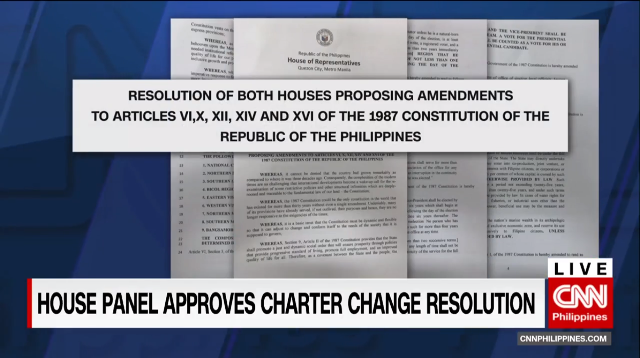Reporting the latest Cha-Cha try: More of the usual

CHARTER CHANGE, it seems, is not quite dead yet.
Behind closed doors, the House of Representatives committee on constitutional amendments passed a resolution on Wednesday, December 11, arguing for some changes in the 1987 Constitution. Among these are extending term limits for local government officials, congressmen and senators; lifting restrictions on foreign investments; and electing the President and Vice President in tandem.
The lower house is eyeing the plenary approval of Cha-Cha proposals by January next year, when Congress reconvenes.
This latest attempt at Cha-Cha was picked up by the media but few pointed out the insidious manner in which the committee approved the proposed amendments. The press could have also pursued some loose ends.
CMFR monitored three major broadsheets (the Manila Bulletin, the Philippine Daily Inquirer and The Philippine Star); four primetime newscasts (ABS-CBN 2’s TV Patrol, CNN Philippines’ News Night, GMA-7’s 24 Oras and TV5’s Aksyon); and selected news websites from December 12 to 16.
Largely usual treatment
Most of the media followed the well-worn track of reporting the procedural developments, enumerating the proposed amendments with quotes from some lawmakers. Most reports also noted the ways in which the Constitution may be amended.
Rappler and News Night’s reports picked up on the important detail, that the committee on constitutional amendments met behind closed doors. On TV, News Night also consulted a political analyst, who raised transparency and integrity issues in the House committee’s clandestine passage of the resolution on the proposed amendments. Aksyon‘s explainer discussed implications of the proposed amendments.
Missed opportunity
Rep. Rufus Rodriguez (2nd District, Cagayan de Oro), who is the chairman of the committee on constitutional amendments, gave an opening when he said that public consultations had already been done across the country, hence the closed-door meeting. Media could follow up with questions on when and where these took place, information that should be verified moving forward with developments.
Some pieces in the op-ed section questioned Rodriguez’s reasoning. The Inquirer’s editorial “Sneaky, insidious, self-serving” asked: “Where are the reports and documentation on these so-called public hearings? Who were consulted, what were they told and what did they say? When and where were these all-important discussions held?” A Rappler editorial also asked: “Were these consultations properly and sufficiently publicized?”
The media have to remind the public that this is not the first time lawmakers have attempted to change the Constitution despite popular opposition to it. These continuing efforts should be closely monitored by the media, whose obligation is to people who deserve to know.
Leave a Reply